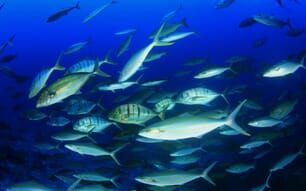The team of researchers of the Nutrigenomics and Pathology Groups of the Institute of Aquaculture Torre de la Sal (IATS-CSIC), in collaboration with scientific (Norwegian University of Life Sciences, Centro de Ciências do Mar) and industrial (BIOMAR, NOREL) partners, found that butyrate supplementation helps to preserve intestinal function in gilthead sea bream that are fed plant-based diets. The research was conducted within the European Union funded projects AQUAEXCEL, AQUAEXCEL2020 and ARRAINA.
Plant-based fish food is seen as more sustainable than that containing other marine products, such as fish meal. Research shows that some farmed fish species can survive without any or with a very limited supply (< 7 per cent) of marine feed ingredients but they can then suffer from decreased efficiency to digest food and increased susceptibility to diseases and stress.
Sodium butyrate is one of the most promising feed additives to be used in aquaculture to prevent these adverse effects. It is a salt of short-chain fatty acid produced by bacterial fermentation of undigested carbohydrates.
Two Transnational Access (TNA) studies, which allow scientists to use research infrastructures in different locations, were conducted to define the most effective butyrate dose for gilthead sea bream based on growth performance and measures of intestinal function, architecture and permeability.
Fish given the butyrate supplement showed fewer intestinal problems normally associated with a plant-based diet. This finding was supported by several different approaches by the research team.
“For example, looking at 80 intestinal genetic markers we could show changes in the expression of genes involved in antioxidant defence, epithelial permeability and mucus production when fish were fed with plant-based diets alone. Most of these were returned to normal when adding sodium butyrate to the diet,” said senior author, Dr Jaume Pérez-Sánchez (CSIC).
Co-author of the publication, Dr Ariadna Sitjà-Bobadilla (CSIC) said the Transnational Access programme was vital in completing the studies: “It would have not been possible to finalise this research and publish the current paper without the programme. Thanks to the two TNA projects we collaborated with two European research groups with complementary expertise to ours.”
Dr Pérez-Sanchez said the facilities the team had access to were an excellent asset: “One of the most difficult steps was to maintain the fish for such a long feeding trial - up to 38 months- without having any technical problems, or mortalities in the experimental fish, thanks to the good conditions of IATS installations. We achieved a record for key performance indicators at the end of the trial.”


